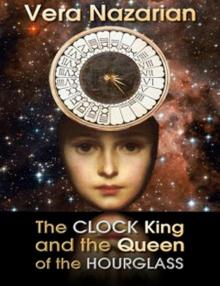- Home
- Vera Nazarian
Cobweb Forest (Cobweb Bride Trilogy) Page 11
Cobweb Forest (Cobweb Bride Trilogy) Read online
Page 11
And saying this, Hecate patted down her kinky wild hair, tugged at the apron around her waist, and then, as the girls continued staring in her, she pointed at the door and added, “As soon as that knock comes, simply tell the dear man from the Palace that I am already there.”
“Yes, Ma’am!” Niosta said breathlessly.
But Hecate was already gone, while the empty wooden rocking chair continued to creak and rock a few more instants without her.
Snow was falling.
Queen Lucia Osenni sat morosely in a deep wingchair near the window in her Royal Spouse’s study and watched its endless white descent, thick and relentless, from a winter sky that was a dreary cocktail of milk and ashes.
The whole world outside was grey despair. Indeed, they were being smothered by a veil of overcast that seemed to have taken over the heavens permanently. It was mid-morning and yet the level of light was that of dusk, so that the street lanterns had to be re-lit to burn in the daytime. Meanwhile Letheburg was being inundated with the white powder, piling on the rooftops and streets. In just a couple of hours it was ankle-deep, and lord knows how bad it would get by evening. By then, it would also be too late for their citywide defense of the walls, as the struggling black-smoke fires that were at present still burning, sputtered into nothing.
For the moment, the exhausted garrison soldiers continued to trudge back and forth on their shifts to hold down the defense of the city. She could see them as dots of dark cobalt blue in the Lethe Square below. Wheeled carts were moving along with difficulty, sinking deep and getting stuck in the icy ruts, and in most cases replaced with freight sleds to glide over the fresh powder. Torches flickered with weak golden light, struggling to stay lit in the snowfall. . . .
Queen Lucia looked away, glancing at King Roland as he was occupied with a large map of the city, spread out on the desk, and arguing with several advisors. Whatever futile strategic nonsense they were considering or planning, she was certain, would do little good now.
Instead, Queen Lucia counted down the minutes until Grial got here. . . . All their hopes lay with Grial, she knew on some odd instinctive level. She would arrive and she would say or do or reveal something useful, even if at first the King always protested and frowned at her “devil suggestions.”
And speaking of the she-devil—a liveried servant announced Grial’s arrival, in what seemed to be an impossibly short amount of time elapsed since the courier had been sent through the snow to fetch her.
The King grunted and frowned, granting his reluctant “audience,” while the Queen immediately stood up from her seat with hopeful excitement.
Grial entered unceremoniously right after the servant, and the general babble of voices in the room quieted while all the distinguished military advisors stared at her, many over their noses or through the lenses of their pince-nez.
“Your Majesties!” Grial exclaimed, nodding with her head once to each Monarch in the remotest kind of courtesy possible, and put her hands together, rubbing her palms on her filthy apron that normally made His Majesty queasy. “Now, how may I be of service?”
“Grial!” Queen Lucia smiled and came a few steps forward, but then relented, seeing her husband’s stern glare.
“Mistress Grial, hmm, well—yes, I realize this is frankly ludicrous, to expect this of you, but I am being told you might have some unusual means of assisting our city defense.” The King coughed to clear his throat and spoke the words reluctantly, setting down the map markers in the form of tiny tin soldiers. He then folded his arms and looked at her.
“Unusual means, Your Majesty?” Was it only a trick of the light, but Grial’s black eyes seemed particularly dark and bottomless today, despite her smile. The nature of the expression in those eyes made the King want to shudder.
But Roland Osenni got himself under control and got to the point. “Unusual, yes,” he said. “As in, sorcery. Witchcraft. The thing that you do, woman! Don’t make me come out and say it!”
“Well, Majesty, apparently you did just say it, and so naturally I must respond.” Grial looked around the chamber, from the King to the Queen to all the advisors, and then she continued, in a bright ringing voice. “Here is the thing, about sorcery and witchcraft. It’s all about using one’s true will and desire and the energy at hand to make something happen. Something very powerful.”
“Go on,” the King said.
“Here we have Letheburg. An entire city surrounded by sturdy and tall walls of stone. And we have a great big army of thoroughly nasty dead men camped outside our walls, trying to get inside.”
“Yes, yes, we already know all this!”
“So what we must do,” Grial said, “is make the walls impossible for the enemy to breach or scale—using the will and the power at hand.”
“Yes, that’s exactly it—whatever it is you’ve just said!” said the King. “Now, proceed to make yourself useful, and do it!”
“Do what, Your Majesty?”
“Oh, for heaven’s sake, Grial, do your infernal sorcery!”
Queen Lucia clutched her hands together, and then added, “My dear, you really ought to ask her gently, I dare say, and maybe use the word ‘please’—”
In response suddenly Grial cackled. Her raucous laughter came ringing through the chamber, and lasted at least long enough to make King Roland want to cover his ears and gouge her eyes out, or maybe gouge his own eyes out—or exactly ten breaths. “Oh, oh, oh dear!” Grial said at last. “My dear Majesty, how you do make me chortle so! Begging pardon, of course, but surely you don’t expect me to do any of this sorcery on behalf of Letheburg?”
“What?” said he, frowning once more. “What now?”
“Why, Your Majesty, this kind of magic may only be performed by the one who is in charge. The one who is ultimately responsible for Letheburg, the guardian or the caretaker, the steward or the lord, the ultimate ruling authority. In other words, Majesty, someone such as Yourself.”
The King glared at her. “What are you saying? I thought you were already performing some kind of binding spell up on the parapets every night! I am told this with great assurances of certainty! Or are my men addled?”
“Goodness, I am merely spreading good cheer up there!” Grial put her hands on her hips, shook her head, and cast her gaze about the room. “Really, now, gentlemen! Did you honestly think I was doing sorcery when I was supplying the good soldiers with my famous apple pies? Why, the girls and I spend every day covered in flour, baking and rolling the dough—”
“Enough!” the King roared. “I knew this was a terrible and foolish mistake calling you here. There is no such thing as sorcery, and all of this has been for nothing—”
“Ah, but I wouldn’t say so, Your Majesty, not quite for nothing!” Grial stopped moving and froze, and her gaze upon him was like the weight of an invisible hand holding him down. “There is indeed sorcery and magic, and yes, wonder and power in this world . . .” she said softly.
They heard her utter the words, and everyone present felt each tiny hair rise along their arms, together with a chill. The room had grown as silent as the grave.
“The one who rules this city must go up on the battlements. This person must walk the entirety of the walls in a great circle, beginning and ending in the same spot, then proceed to stand up there, holding two torches raised up to the heavens, and look out beyond the walls to face the enemy. This individual must stand thus, one whole day and one whole night, and never waver, using all the will and power in their heart to create the true wall of safety and protection around Letheburg. After that, no one will be able to breach the city, for as long as the true ruler remains within the walls, or simply wills it to be so.”
When Grial finished speaking, the abysmal silence continued. King Roland stood, plunged in thought, and a deep frown was crippling his features.
“So you’re saying I must go up there, and stand with torches a whole day and night while some kind of magic happens, and all the while I get shot at b
y muskets and arrows and heaven knows what other hellfire that they’re sending our way?” the King said eventually.
“Why, yes, Your Majesty. But it’s not all that different from what the good soldiers are already enduring up there as they aim and fire and strike and chop and throw down the corpses back into the fire below, while keeping themselves safe as best they can. At least all you would have to do is merely stand there and look out, after taking a nice leisurely walk around the entirety of the walls.”
“Damnation!” King Roland burst out. “Is there no other way?”
“Not really, I am afraid not, Your Majesty.”
“And how would I know that the sorcery is working?”
Grial smiled, and the smile filled her face, but never quite reached the depths of her so-very-dark eyes.
“You would know it worked,” she said, “because by the end of the day and night you and this city would still be alive and standing.”
Another long pause of grim silence.
“Wait!” said the King. “You say that only the ultimate figure of authority, the—uhm—highest ruling personage may attempt this feat of sorcery? Could it be interpreted to mean the one who is highest ranking?”
“It could, Majesty, it certainly could.”
“Well then!” King Roland Osenni exhaled in profound relief. “While it is obvious that I am the King of Lethe and ruler of this fine city, it cannot be forgotten that we have an even higher authority in our midst! Naturally I speak of Her Imperial Highness, the Grand Princess Claere Liguon, who is the Emperor’s own daughter and Heir to the Crown of the Realm! Why, it is clear as day that she and none other must be the one to perform this deed of sorcery!”
“Oh, Roland, are you certain? Why, the poor dear is but a child!” Queen Lucia spoke up, with an uncertain glance to Grial and then back to her spouse.
“She is certainly a capable Grand Princess, and she is of age, if you might recall, having recently turned sixteen—”
“But she is dead!” Lucia said.
“Even more reason why she should be the one to do this dangerous procedure,” the King said firmly. “No further harm can come to her, if she takes care to keep away from burning projectiles, and if she is properly guarded—as she most certainly will be. Her Imperial Highness has already demonstrated an excellent diplomatic ability in her attempt to parlay with the villain Hoarfrost. Now she can demonstrate her ability to rule.”
“Wonderful! It is settled then, Your Majesty!” Grial said in her ringing voice. She looked at the King unblinkingly, with a curious smile.
“It certainly is settled. You, Mistress Grial, will now proceed to show Her Imperial Highness how it is all to be done. And so, let us not waste another moment here.”
And with those words the King wiped the palms of his hands against his jacket and sent servants to inform the Infanta of her new duty and fate.
Snow was falling.
Outside the window of the moving carriage the air was thick with the illusion of white blossoms descending from heaven, delicate petals swirling, and the streets of Letheburg appeared to be ghostly shapes of pallor. Occasional dark lines of building corners came into view and angular roofs jutted out, and then came lines of street lanterns burning in rare bright spots through the veil of snowfall.
Claere Liguon sat next to Vlau and across from Grial in the carriage. They were headed once more toward the city walls.
Half an hour ago, Claere had been in her chambers in the Winter Palace, seated on the sofa, her soul isolated in the prison of her dead flesh, as always. Only now that same soul was a strange, joyful prisoner, brimming with a sense of completion . . . a soft wistful serenity, and a rush of impossible wonder.
Everything was different now, after what had happened between them in the darkness before dawn.
He was at peace with her at last, even though he was never to be at peace with himself.
He loved her.
After their moments of shared intensity—the confessions that had happened just before the first light, awkward, bittersweet, perfectly forthright for the first time, and at long last—after he had wept and wanted to die, and offered up his life to her, Vlau had fallen asleep once more in exhaustion. Only this time, his head rested in her fragile lap, and her fingers, cool and brittle like china and stained with his tears, were cradling him gently, stroking his soft dark hair . . . even though she could barely feel its touch.
And then came the knock on the door, shattering their illusion of peace, and once more the Royal Summons.
Claere felt something like a distant memory of having a heart, and then having that same living heart torn out of her by the disruption of their impossible, illusory, soft time together. Vlau came awake into grey dawn and into both exultation and despair, for he glanced first into her eyes, and there was everything in that look, all of him. “Claere . . .” he whispered. And then they faced the summons together.
This time, fortunately, they saw a familiar and welcome face. Together with a liveried royal servant, Grial, of all people, entered the chamber.
Grial was dressed as always in a colorful shabby dress and stained apron, and her kinky strands of wild unruly hair stood out past her attempt at a head kerchief.
But even as Claere looked at her, there was something decidedly different in Grial’s very dark, very black eyes. . . . Whatever it was, however, Claere had no time to consider.
“Good morning, Your Imperial Highness! And Vlau, my dear young fellow!” Grial exclaimed, and her raucous loud voice for some reason acted like a warm soothing balm.
“Grial!” said Claere. “Oh, I am so glad to see you! What are you doing here?”
“Well, dearies, my heart is entirely aflutter to see both of you!” said the older woman, advancing to the sofa and suddenly putting both her hands on each one of their shoulders. “But, it appears that we have a very long day ahead of us, dumplings! Up you go, right now! To the battlements we head immediately, on the fine orders of His Royal Majesty—and a fair amount of orders there have been indeed, I dare say! An order here, an order there, and it all comes down to this—Letheburg needs your help, young lady, and a Grand Princess is the only one who can provide it!”
“What?” Claere almost forgot to draw the requisite amount of air to operate her lungs, and at first it came out in a creak. “My help? What do you mean, Grial? What does the King command? The battlements, again? Is it the Duke Hoarfrost?”
“No, girlie, thankfully it is not that stubborn old lump of a Duke, not this time. Instead, I am going to show you a little bit of—well, how does one call it?—oh yes, I do believe it is called magic. But, fear not! Because magic and sorcery is in truth all nonsense and silly posturing while following a complicated recipe, and ordinary smart people are rightfully cautious of all that woo-woo, as well as any sane person should be! Thus, no—while His Majesty might expect me to show you spells and sorcery, what I am going to teach you instead is the magical power of your desire.”
Grial proceeded to describe with her usual manic energy and enthusiasm what was expected of Claere—how she was to circle the entire walkway around the city battlements, then stand up and hold the torches, and of course how she was to dream and think and use the power of her imagination just so, and in a very particular way.
While spewing forth this equally disturbing and comforting torrent of chatter, Grial took both Claere and Vlau by the hands and practically dragged them after her, first however ordering Vlau to grab his warm cloak, and use the privy next door to Her Highness’s chambers, since it was going to be a very long day and night. Grial then told the Palace servants to hurry and fetch some freshly baked rolls for the young man to eat on his way—since there was no time for a sit-down breakfast.
A short time later they descended the many Palace stairways, exiting outside into a pale grey world filled with flurries of snow. Next thing they knew, they were stepping into a carriage surrounded by a military convoy, and sitting down on velvet-upholstered cu
shions across from each other. Grial wore her usual simple coat and her wide-brimmed hat, while Claere had her new velvet cloak courtesy of the King, and Vlau was dressed in a barely adequate wool jacket worthy of a lower servant.
Vlau however did not seem to be aware of anything else around them, and did not even notice that he held Claere’s cold little hand in a tight merciless grip—not until they were seated and being driven through the city.
Claere broke the silence at last. “Why me?” she asked. “Why does His Majesty want me to do this thing?”
“Because,” Vlau said with intensity, answering in Grial’s stead, “you are the only one who can.”
“Oh, well said, young man, well said!” Grial nodded at Vlau with a smile of approval.
In a matter of minutes it seemed, they approached the city walls. It was soon apparent how badly these fire-ravaged neighborhoods had suffered since morning, for even the new blanket of snow did not sufficiently cover the smoking ruins of wooden houses and the piles of rubble resulting from the projectiles cast by the catapults. Soot and grey smoke was everywhere, mixing with the snowflakes, and so were the garrison soldiers, carrying out their grim duty and moving rapidly to perform the needed tasks in this broken military hive.
Their carriage stopped at the pomoerium space before the walls, filled with wounded soldiers and supply carts and smoking rubble, and the small convoy of the King’s elite soldiers accompanying them led the way. Claere recognized the same captain who had taken them to parlay with Hoarfrost, and this time he bowed to the Infanta respectfully, then nodded to Vlau. Following him, they again ascended to the battlements, engulfed by an auditory sea of shouts and hoarse cries of agony and the familiar crackle of the flames. Except, now the flames beyond the walls had gone down to a low simmer instead of a roar, the orange glow had been replaced with a thick curtain of black smoke, and the Letheburg soldiers were engaged in fierce melee fighting along nearly crenel and merlon of the parapets.

 Cobweb Bride
Cobweb Bride Survive
Survive![[Atlantis Grail 01.0] Qualify Read online](http://i1.bookreadfree.com/11/atlantis_grail_01_0_qualify_preview.jpg) [Atlantis Grail 01.0] Qualify
[Atlantis Grail 01.0] Qualify Lords of Rainbow
Lords of Rainbow Cobweb Forest (Cobweb Bride Trilogy)
Cobweb Forest (Cobweb Bride Trilogy) Compete
Compete Cobweb Empire
Cobweb Empire Northanger Abbey and Angels and Dragons
Northanger Abbey and Angels and Dragons Dreams of the Compass Rose
Dreams of the Compass Rose Win
Win The Clock King and the Queen of the Hourglass
The Clock King and the Queen of the Hourglass The Duke In His Castle
The Duke In His Castle Old Farts
Old Farts